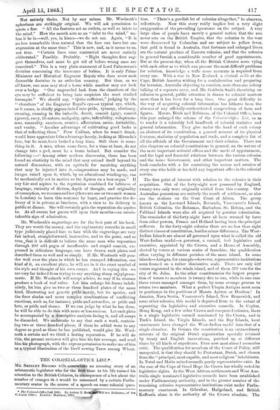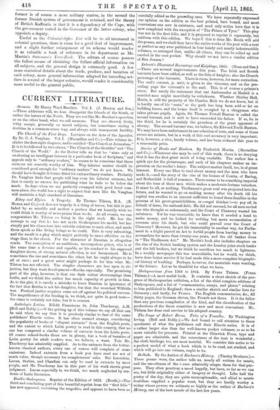THE COLONIAL-OFFICE LIST.* ,
MR. SHIRLEY Bnooxs tells somewhere an amusing story of an aristocratic legislator who for the firsle time in his life turned his attention to the British Colonies, in consequence of a bet about the number of oranges th t would be consumed by a certain Parlia- mentary orator in the course of a speech on some colonial ques- • The Colonial-Office List, 1865. By Arthur N. sot Robinson, of the Colonial Oak!. London : Harrison, 1865.
tion. "There's a goodish lot of colonies altogether," he observes, reflectively. Now this story really implies but a very slight exaggeration of the prevailing ignorance on the subject. A very large class of people have merely a general notion that the sun never sets on the British Empire, that the colonies in the west were discovered by Columbus and are subject to yellow fever, that gold is found in Australia, that fortunes and enlarged livers are the natural produce of Eastern colonies, and that the colonies
in general furnish a considerable number of good appointments. But at the present day, when all the British Colonies seem vying with each other as to which can present the most difficult problems for solution, knowledge a trifle more accurate is required from every one. With a war in New Zealand, a clerical melee at the Cape, British America wishing for a confederation and preparing for invasion, Australia objecting to convicts, more than one colony talking of a separate navy, and Mr. Goldwin Smith theorizing on colonies in general, public attention is drawn to colonial matters more than it has been for a long time. One great difficulty in the way of acquiring colonial information has hitherto been the absence of any officially-authenticated compendium of facts and figures. Messrs. Birch and Robinson, of the Colonial Office, have this year enlarged the scheme of the Colonial-Office List, so as to render it a tolerably full handbook of colonial statistics and general information. They give under the head of each colony an abstract of its constitution, a general account of its physical features, statistics of population and trade, and a complete list of all the officials of the Government an I their salaries. There are also chapters on colonial constitutions in general, on the nature of the more important colonial offices and the mode of appointment, and the legal and financial relations between the various colonies and the home Government, and other important matters. The book concludes with a list containing the names and services of every one who holds or has held any important office in the colonial service.
The first point of interest with relation to the colonies is their acquisition. Out of the forty-eight now possessed by England, twenty-two only were originally settled from this country. Our Australian possessions are entirely the result of settlement, as also are the stations on the West Coast of Africa. The group known as the Leeward Islands, Bermuda, Vancouver's Island, British Columbia, the Bahamas, Barbadoes, St. Helena, and the Falkland Islands were also all acquired by genuine colonization. The remainder of the forty-eight have all been wrested by force from other powers, France and Holland having been the principal sufferers. In the forty-eight colonies there are no less than eight distinct classes of constitution, besides minor differences. The West- Indian Islands are almost all governed upon what is called the old West-Indian model—a governor, a council, both legislative and executive, appointed by the Crown, and a House of Assembly, elected by voters at various scales of franchise, the qualification often varying in different parishes of the same island. In some islands—Antigua, for example—however, representative institutions seem framed on a rather diminutive scale. There are only 522 voters registered in the whole island, and of them 319 vote for the city of St. John. In the other constituencies the largest propor- tion of voters to members is twenty-five to one, while in one case three voters managed amongst them, by some strange process to return two members. What a perfect Utopia Antigua must seem to gentlemen in the positions of Messrs. Ayrton or Doulton ! In Jamaica, Nova Scotia, Vancouver's Island, New Brunswick, and some other colonies, this model is departed from to the extent of separating the legislative and executive councils. In Ceylon, Hong Kong, and a few other Crown and conquered colonies, there is a single legislative council nominated by the Crown, and in Turk's Island, the Virgin Islands, and the Bay Islands, local enactments have changed the West-Indian model into that of a single chamber. In Guiana the constitution is an extraordinary mixture of the original Dutch organization specially retained by treaty and English iunovatious, patched up at different times by all kinds of expedients. Even now most absurd anomalies exist. The qualification for members of the Court of Policy, still unrepealed, is that they should be Protestant, Dutch, and chosen from the "principal, most capable, and most religions " inhabitants. In Natal and Malta mixed councils partly representative exist. In the case of the Cape of Good Hope the Crown has wholly ceded its legislative rights. In the West-African settlements and West Aus- tralia single nominated legislative councils have been established under Parliamentary authority, and in the greater number of the remaining colonies representative institutions exist under Parlia- mentary enactment. In Gibraltar, Heligoland, and British Kaffraria alone is the authority of the Crown absolute. The
former is of course a mere military station, in the second the former Danish system of government is retained, and the theory of British Kaffraria is that it is a dependency of the Cape, with the government vested in the Governor of the latter colony, who appoints a deputy.
Useful as the Colonial-Office List will be to all interested in colonial questions, there is room for a good deal of improvement, and a slight further enlargement of its scheme would render it as valuable a book of reference in its department as Mr. Martin's Statesman's Year-Book. The editors of course possess the fullest means of obtaining the fullest official information on all subjects, and the general design is extremely good. A few more statistical details about the trade, produce, and taxation of each colony, more general information adapted for intending set- tlers in several of the larger colonies, would render it considerably more useful to the general public.































 Previous page
Previous page